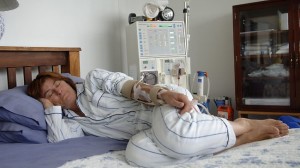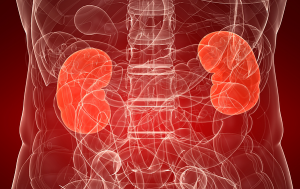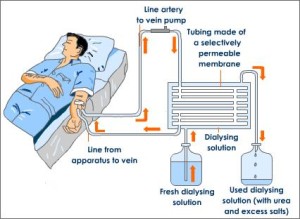Myth 1: Once you are diagnosed with kidney failure – you will definitely end up with dialysis in the future
There are many reasons why you can be diagnosed with kidney failure. It can be due to diabetes complication, glomerulonephritis (where there is inflammation in the kidney), hypertension, kidney stones etc. You only need to undergo dialysis once you have progressed to end stage renal failure (ESRF). With early diagnosis – some kidney disease is curable or we can stop it from progressing to ESRF.
How do we do it? It depends on what is the cause of the renal failure in the first place. Some can be due to obstruction in the kidney which can be rectified through surgery. If it is due to complication from chronic disease like diabetes or hypertension – we need to control the disease optimally with medications. Some patients may need steroids or stronger immunosuppressive drugs if the cause of renal failure is due to inflammation of the kidneys (due to primary glomerulonephritis or autoimmune disease like SLE). Some patients develop renal failure due to side effects of drugs like antibiotics and painkillers – in these patients – kidney function can recover once you stop the offending drug.
Myth 2: Kidney failure happens whenever one of the kidney fails.
You need both kidneys to fail completely to develop ESRF. Most people can survive with one kidney. Because of this fact, a healthy person can donate one of their kidneys to an ESRF patient. With that one piece of kidney, a dialysis dependent renal patient may no longer need to undergo dialysis anymore.

Source: http://www.news.com.au/technology/sci-tech/in-lab-bio-kidney-offers-hope-for-renal-patients/story-fn5fsgyc-1226620383432
Myth 3: I don’t want to start on dialysis because I’ll be tired all the time and can no longer work.
Tiredness or lethargy is one of the most common symptom you will have once you are diagnosed with ESRF. In fact, without dialysis, in addition to feeling tired all the time, you can also have fluid retention symptoms causing breathing difficulty, lose appetite, nauseated and vomiting. You may develop further complications like acute pulmonary edema, confusion or uremic encephalopathy, severe acidosis and high potassium with heart rhythm abnormality that can ultimately lead to cardiorespiratory arrest death.
Most patients actually report that the opposite happens. After starting dialysis, their appetite improves and feel more energized. They find breathing easier and can function better at work.
Once you start on renal replacement therapy (RRT) or dialysis, there is not much reason that can stop you from working. There are many types of dialysis which can be administered according to your lifestyle You need to discuss with your nephrologist which is the best mode of RRT for you.
There are options like home dialysis or if you work flexible hours – you can actually arrange your dialysis sessions around your working hours. Some patients can even do their work online while undergoing dialysis at the dialysis center. You can also opt for portable peritoneal dialyser if you travel a lot.
Myth 4: I don’t like needles and pain. Dialysis is not for someone who fear needles.
For patients on hemodialysis and the RRT access is through an arterio-venous fistula, you may have some discomfort when the needles are put into your fistula or graft. However, to most patients – they usually have no other problems. The dialysis treatment itself is painless. However, some patients may have a drop in their blood pressure that could lead to nausea, vomiting, headaches or cramps. But, as long as you take care to follow your kidney diet and fluid restrictions these types of side effects can be avoided
Myth 5: If I do peritoneal dialysis – I can die from infection
Peritoneal dialysis (PD) is a form of dialysis where blood vessels in your abdominal lining (peritoneum) fill in for your kidneys, with the help of a fluid (dialysate) that flows into and out of the peritoneal space to filter out toxins and maintain fluid balance in your body. Compared to hemodialysis where you can only do it in dialysis centers – with PD – you can do dialysis at home, at work or even while traveling. You may be able to use fewer medications and eat a less restrictive diet than you can with hemodialysis.
For PD however, you need to make sure the site of the catheter to be clean so it does not get infected. With very good care, risk of infection can be minimised. Even if you ended up with infection, your nephrologist can treat it with antibiotics. Risk of death is higher for patients who have had infection not only from peritoneal dialysis, also from a graft or dialysis catheter in hemodialysis.
Take home message is – keep your dialysis access either graft, PD catheter or hemodialysis catheter clean to reduce infection. Take septic precautions during dialysis procedures.
Myth 6: People on dialysis can no longer travel
You can still go travel overseas for holidays, visit family or travel for work with some advance planning and dialogue between you, your doctor, nurse and social worker. Patients on hemodialysis can arrange treatments at a center at their planned vacation destination. Patients on PD can bring their portable dialyser and have supplies directly delivered to wherever they are going.
Myth 7: Dialysis patients cannot get pregnant
When you develop ESRF on dialysis, it is difficult to conceive but it is not impossible. Pregnancy can occur in approximately 1% of patients, usually within the first few years of starting dialysis.
However, pregnancy in ESRF patients have a rather mixed outcome. In fact, it is a relative contraindication. They have higher risk of complications such as pre-eclampsia and higher risk of miscarriage or stillbirth with only 23-55% of such pregnancies result in surviving infants. Also, approximately 85% of surviving infants are born premature and 28% are born small for gestational age. ESRF patients who underwent successful renal transplant have higher chance of conceiving and have successful pregnancy.
If you are still keen to conceive, you are advised to discuss with your nephrologist regarding your plans. Some of your medications may need to be stopped and to increase your chance of conceiving, you may need to undergo a much more intensive dialysis regimen to keep your blood pressure and creatinine level in stable range. Multidisciplinary teams which includes your obstetrician, nephrologist, nutritionist, anesthesiologist are vital to ensure you have a successful pregnancy.
Myth 8: If you start dialysis early, you die faster
ESRF patients, whether on dialysis or not, has higher mortality or in other words – they die earlier compared to people without kidney failure. They have higher chance to get heart attack and death from infections from community or hospital associated infections.
But once you start dialysis, your have higher chance to survive compared to a non-dialysing ESRD patients. Early dialysis does not cause you to die earlier.
Myth 9: Dialysis and preparation for dialysis are expensive
While it is true to certain extent, there are a lot of ways to lessen your financial burden. Once you are initiated on dialysis – you can get financial support by getting sponsorships from NGO like the Buddhist Tzhu Chi society, Rotary club and National Kidney Fundation or government bodies like Pusat Zakat or Yayasan Kebajikan Negara. Some of these societies even run dialysis centres with very affordable rates. If you are a pensioner, you can get your dialysis cost covered by Public Service Department.
Myth 10: Once you are on dialysis – you no longer can eat all of your favorite food
You still can! As someone with kidney failure, you will be advised to reduce your salt intake. You have to avoid eating high potassium and high phosphorus containing food. Avoid processed and canned food. I advise for you to cook and eat at home. Take more fresh food. Instead of salt or MSG, use herbs and spices. You can try make your favorite food in a ‘kidney-friendly’ version. Be creative!
Some recipes here:
HKL Buku Resepi Pesakit Dialisis
http://www.hkl.gov.my/content/cookbook.pdf
http://www.kidney.org/patients/kidneykitchen/recipes.cfm
http://nwkidney.org/healthyLiving/livingWell/nutrition/recipes/recipesList.html
You can read more on kidney-friendly diet here:
http://www.vcuhealth.org/upload/docs/transplant/renal_diet.pdf
[This article belongs to The Malaysian Medical Gazette. Any republication (online or offline) without written permission from The Malaysian Medical Gazette is prohibited.]



Thank you for this article Dr Nur Hidayati. I have polycystic kidney since a few years ago and now getting near to ESRF. My doctor had advised to go for PD assessment in Selayang. My last creatinine was already 326 and it has been gradually increasing. Otherwise, i feel healthy nothing out of ordinary. No fluid retention yet, breathing so far so good except weight issue :). My mom died at the age of 48 and she was never on dialysis. She died due to DIVC.
Please share more news about kidney problem and maybe share some thought of my condition.
Thank you
Salam Ida
Thankyou for commenting.
Adult polycytic kidney is actually a genetic disease where you can get cyst formation commonly inside your kidney, sometimes even liver, spleen etc. Almost half of people that has this disease ended up with renal failure and some need to be on dialysis. I do support your doctor’s suggestion for you to go for early peritoneal dialysis assessment. In my opinion, peritoneal dialysis is a good option for young adults that have to go for dialysis. Going for PD assessment does not mean you need to be initiated on dialysis already. It may just mean the doctor wants you to be prepared early in the event you have to undergo dialysis in the future. No need to be afraid.
I am very sorry to hear about your mom. Does she have polycystic kidney too? At this stage you need to be followed up by a nephrologist who can assess you and monitor you for renal disease complication.
Hope that helps. I will try to write more articles regarding renal failure as well as dialysis in the future. 🙂